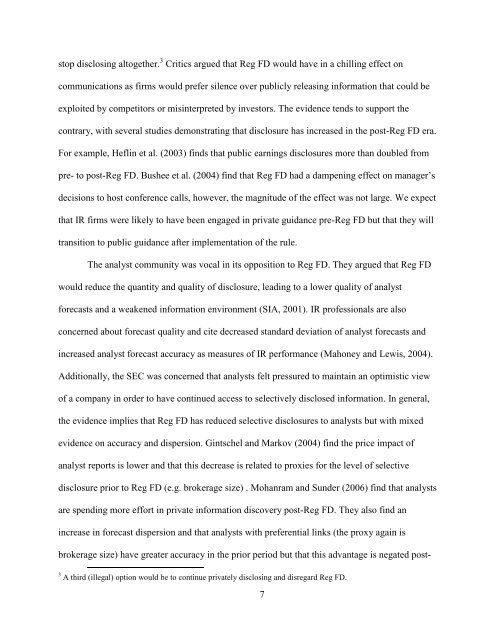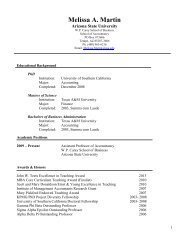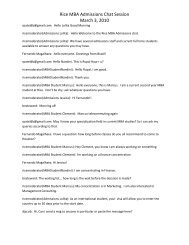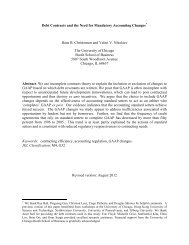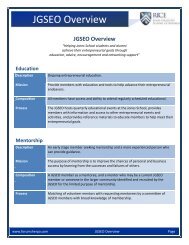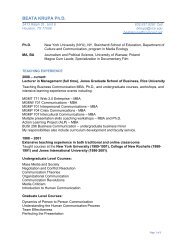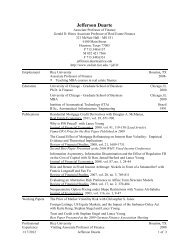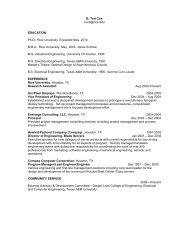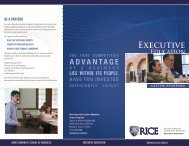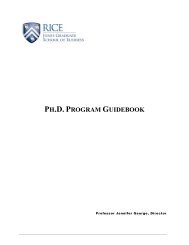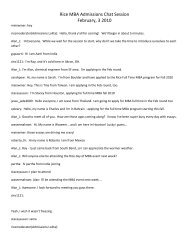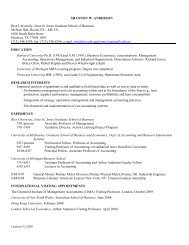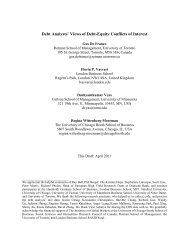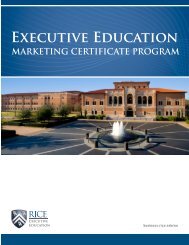Investor Relations and Regulation FD
Investor Relations and Regulation FD
Investor Relations and Regulation FD
You also want an ePaper? Increase the reach of your titles
YUMPU automatically turns print PDFs into web optimized ePapers that Google loves.
stop disclosing altogether. 3 Critics argued that Reg <strong>FD</strong> would have in a chilling effect on<br />
communications as firms would prefer silence over publicly releasing information that could be<br />
exploited by competitors or misinterpreted by investors. The evidence tends to support the<br />
contrary, with several studies demonstrating that disclosure has increased in the post-Reg <strong>FD</strong> era.<br />
For example, Heflin et al. (2003) finds that public earnings disclosures more than doubled from<br />
pre- to post-Reg <strong>FD</strong>. Bushee et al. (2004) find that Reg <strong>FD</strong> had a dampening effect on manager’s<br />
decisions to host conference calls, however, the magnitude of the effect was not large. We expect<br />
that IR firms were likely to have been engaged in private guidance pre-Reg <strong>FD</strong> but that they will<br />
transition to public guidance after implementation of the rule.<br />
The analyst community was vocal in its opposition to Reg <strong>FD</strong>. They argued that Reg <strong>FD</strong><br />
would reduce the quantity <strong>and</strong> quality of disclosure, leading to a lower quality of analyst<br />
forecasts <strong>and</strong> a weakened information environment (SIA, 2001). IR professionals are also<br />
concerned about forecast quality <strong>and</strong> cite decreased st<strong>and</strong>ard deviation of analyst forecasts <strong>and</strong><br />
increased analyst forecast accuracy as measures of IR performance (Mahoney <strong>and</strong> Lewis, 2004).<br />
Additionally, the SEC was concerned that analysts felt pressured to maintain an optimistic view<br />
of a company in order to have continued access to selectively disclosed information. In general,<br />
the evidence implies that Reg <strong>FD</strong> has reduced selective disclosures to analysts but with mixed<br />
evidence on accuracy <strong>and</strong> dispersion. Gintschel <strong>and</strong> Markov (2004) find the price impact of<br />
analyst reports is lower <strong>and</strong> that this decrease is related to proxies for the level of selective<br />
disclosure prior to Reg <strong>FD</strong> (e.g. brokerage size) . Mohanram <strong>and</strong> Sunder (2006) find that analysts<br />
are spending more effort in private information discovery post-Reg <strong>FD</strong>. They also find an<br />
increase in forecast dispersion <strong>and</strong> that analysts with preferential links (the proxy again is<br />
brokerage size) have greater accuracy in the prior period but that this advantage is negated post-<br />
3 A third (illegal) option would be to continue privately disclosing <strong>and</strong> disregard Reg <strong>FD</strong>.<br />
7


